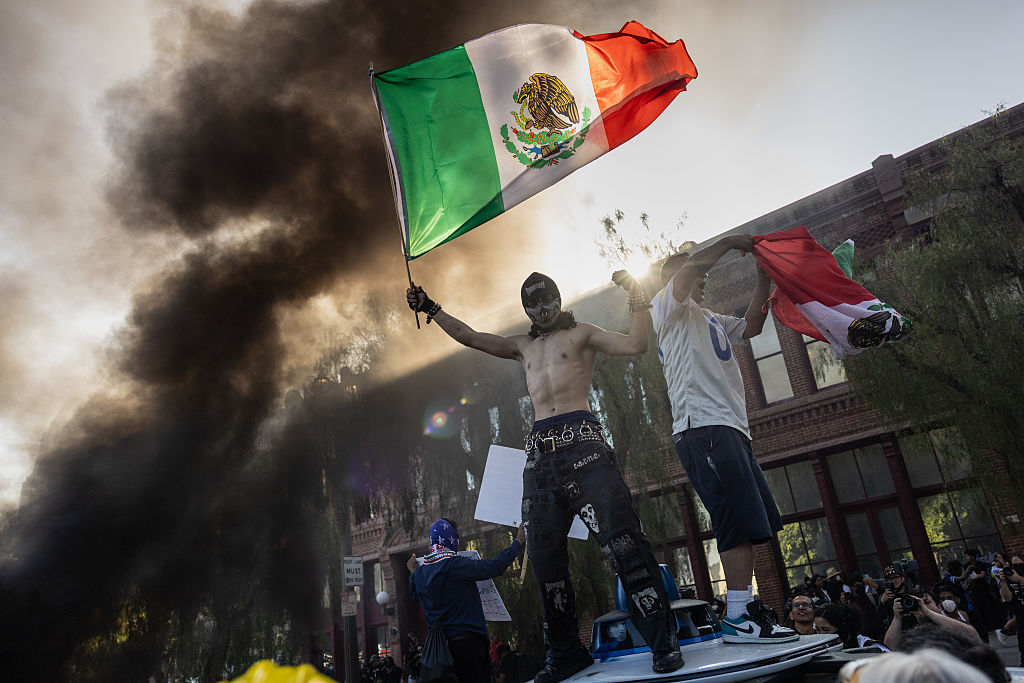The riots raging in Los Angeles are an unwelcome present ahead of America’s birthday, which is less than a month away. But they’re also a timely reminder of just what that birthday, the Fourth of July, is about. After all, American independence was conceived in rioting and brazen defiance of law enforcement.
Some 250 years ago, Boston was aflame with the spirit of resistance. Then, too, as in LA today, soldiers had to be called out to quell the mobs. In 1770, that led to an incident known to history as the Boston massacre. Violently harassed by hundreds of protesters, seven British soldiers fired into the crowd, killing three people on the spot and wounding several more, two of whom later died.
Those casualty figures might be what’s called “the weekend” in some of our cities today. But what matters where political violence is concerned is how the bloodshed combines with cries of principle. If the Marines that President Trump has sent to Los Angeles kill five protesters, those who sympathize with the mob will say this proves everything they’ve long been warning about. They claimed Trump was a fascist – and here’s the proof. The mere sight of police in riot gear and soldiers moving into the city already confirms many liberals’ worst fears.
The issue at the heart of the unrest then and now might seem to be very different – but in fact it’s the same. The American colonists would not submit to foreign rule, and the British, they came to feel, were not fellow countrymen from across an ocean but an alien power. The Declaration of Independence on July 4, 1776, put that feeling into legal terms, the law in question being not the law of England but “the laws of nature and nature’s God.” The Americans were one people and the British were another, and because British laws and leaders were bad for the American people, in their own estimation (and, they argued, surely in the eyes of the world, too), the people of the United States were prepared to sever their connections with the king they shared with England and his minister and establish their own new government.
This year’s LA riots are also about drawing the line between foreign and native. But this time it’s the rioters who are flying the flag of an alien government, namely Mexico’s. What looks foreign to one side registers as native to the other, however. The illegal immigrants resisting arrest feel entitled to be where they are, and the protesters supporting them do not concede the legitimacy of the United States government to enforce its laws. They just don’t have a Thomas Jefferson, or anyone as brave and honest as he was, to make explicit what their defiance really means.
Rioting is an American tradition that Republicans as well as Democrats occasionally indulge – though it has to be said that Democrats indulge it much more often and to a greater extent, as a comparison of the January 6, 2021 hooliganism at the nation’s Capitol to the arson and shootings that accompanied the George Floyd protests a few months earlier will attest. And progressives more often than not consider “protest,” even when it descends into street violence, an inherently noble thing. But be that as it may, the crux of contention between left and right is not about rioting but about allegiance. American patriots once used mob tactics and scofflawery to clear the way for the form of government expressed by the Declaration of Independence and the US Constitution. And the greatest debate the new nation had to have with itself after it had won its independence was whether the protest politics that had sparked the Revolution would continue – sustaining a continual revolution, or igniting one after another – or whether a more stable kind of politics, with greater respect for government, would be established with the Constitution. Overthrowing the British was one thing; overthrowing the republic that the patriots themselves had fought to create was another. This was their own country, after all.
Even at the time, there were some radical Americans who did think the upheavals should continue – Jefferson himself thought the Constitution should be rewritten every generation. The progressive liberals who support today’s riots in LA are no Jeffersonians, however, because they don’t even think of this country as theirs. Their country is larger and less local, bypassing existing borders and encompassing a public that may wave many different flags, including Mexico’s. This public consists of all who are considered oppressed or disadvantaged, regardless of their citizenship or legal status. And representing this public is not a formal government elected by the people – there can’t be such a thing when there is no concrete, place-specific citizen population – but a class of leaders who are entitled to speak for the oppressed by virtue of their superior understanding of human rights.
The battle on the streets of LA is between these two different ideas of government. Laws that do not conform to progressive ideas of human rights, including (and especially) immigration laws, are as invalid as taxation without representation was for the American patriots. But the progressives are anti-patriots, whose whole idea of government rejects the kind of patriotism and government that the American Revolution was fought for – not in the name of going back to British paternalism but in the name of going forward to a universal liberal order. The philosophical descendants of the riotous revolutionaries, meanwhile, are now conservative populists who have to defend what was set up more than 200 years ago. The American Revolution drew a line separating America from British power. The revolution the LA riots are advancing today is about erasing the line separating America from Mexico and from everyone else. The old American revolutionaries fought for a government of their own. The new post-American revolutionaries are fighting for a government that is not beholden only to its citizens but that instead belongs to everybody – and therefore to nobody. It’s the citizen, or rather the subject, who belongs to the government, or rather the ruling class, in this new order. The Los Angeles riots are not likely to turn into anything that looks like the revolution of 250 years ago. But the implications of what’s happening now are just as profound.
So happy birthday, America – and let’s hope your 250th won’t be your last.


























Leave a Reply